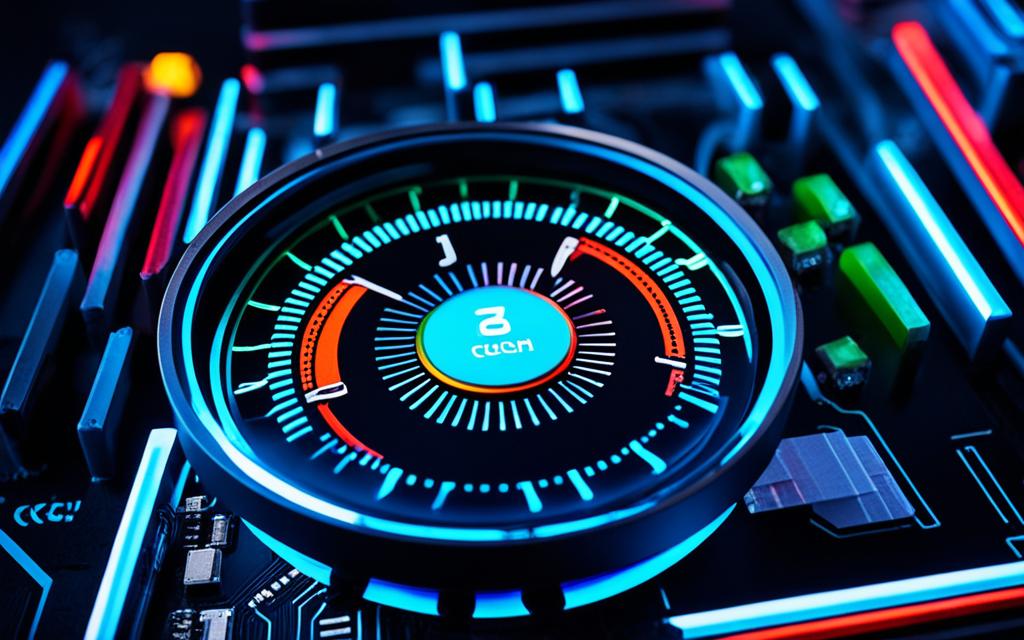Table of Contents
Keeping an eye on CPU temperatures is key when gaming. Gamers test their systems’ limits, and knowing how hot the CPU gets is crucial. The ideal temperatures are between 70°C and 80°C (158°F to 176°F) during gameplay12. Going over 90°C (194°F) can cause real damage. This piece will look at the safe temperature ranges and offer tips to keep your CPU cool for the best gaming experience.
Key Takeaways
- The ideal CPU temperature while gaming is between 70°C and 80°C.
- Idle temperatures should be around 30°C to 40°C for efficiency.
- Maintaining CPU temperatures is vital to prevent damage and maintain performance.
- Overclocking can significantly raise CPU heat output, making temperature monitoring crucial.
- Cleaning dust from components will help improve thermal performance and airflow.
Understanding CPU Temperatures
For gamers, keeping an eye on CPU temperatures is key to top-notch gaming. The CPU is the heart of the computer, running all the complex tasks for games and apps. It heats up a lot during long gaming bouts, so knowing about its temperature is crucial. This helps avoid any dips in performance or damage.
The Role of the CPU in Gaming Performance
The CPU’s role in gaming greatly affects how smooth games run, especially those with rich graphics. As the game gets more demanding, the CPU works harder and gets hotter. It’s best to keep CPU temperatures under 70°C when it’s not doing much and below 80°C when fully loaded3. With powerful CPUs like the Intel Core i9 heating up to 100°C, having a strong cooling system matters a lot4.
How CPU Temperatures Influence Gaming
High CPU temperatures impact gaming quality and the lifespan of your hardware. Crossing 85°C can lead to thermal throttling where the CPU slows down4. CPUs have a sweet spot: below 50°C when idle, under 70°C for light tasks, and under 80°C for heavy-duty work3. Good cooling and airflow are essential to stop overheating and keep things running smoothly.
What Is Good CPU Temperature?
Understanding the ideal temperature for your CPU is crucial for its performance and life span. The idle temperature should be between 30°C and 40°C (86°F to 104°F). This shows the cooling system works properly. You should regularly check to make sure the temperature stays within this range.
Going beyond these levels might mean the cooling is not working well or there are hardware issues. It’s key to monitor CPU temperatures, especially for gaming, to keep things running smoothly.
The Idle Temperature Range
A good CPU temperature when idle is key for system health. If it’s above 40°C often, your cooling might not be sufficient. Tools like Core Temp or HWMonitor make it easy to watch your idle temperature.
Keeping a good temperature ensures your CPU does its best without overheating risks.
Normal Operating Temperature Under Light Use
With light CPU use, temperatures should stay as they are when idle. A climb above 40°C suggests a need to check cooling methods. Ideal temperatures are between 30°C and 40°C even during light tasks.
It’s vital to watch your CPU’s temperature closely. Tools and BIOS checks can help keep it right. This ensures your system works well and lasts longer, avoiding heat-related issues.
What Is Normal CPU Temp While Gaming
Gamers need to know the safe CPU temperatures for the best performance. Understanding normal temperatures helps make better choices for their computers.
Average Temperature During Gaming Sessions
The normal CPU temp while gaming is usually between 70°C (158°F) and 80°C (176°F). This range is safe, even under heavy use1. Going above this can affect your game and harm your CPU over time1. Most CPUs are okay up to 80°C, letting you enjoy great graphics smoothly2.
With good cooling, desktops often stay around 50°C (122°F) when gaming2. This shows how crucial good cooling is.
Factors Influencing Peak Temperatures
Many things affect how hot your CPU gets during games. The kind of CPU, its cooling system, and the room temperature matter a lot. Overclocking your CPU makes it work harder, producing more heat1. The temperature and air in your room also affect how well your CPU cools down4.
| Temperature Range | Condition | Recommendation |
|---|---|---|
| 70°C – 80°C (158°F – 176°F) | Normal gaming session temperatures | Safe for extended gaming |
| Below 70°C (158°F) | Ideal for high performance | Avoids potential overheating |
| 80°C – 90°C (176°F – 194°F) | Warning zone | Monitor closely; potential issues |
| Above 90°C (194°F) | Critical danger zone | Immediate cooling actions required |
Knowing about CPU temperatures helps gamers avoid heat-related issues. This improves their gaming experience142.
How to Check CPU Temperature
Keeping an eye on your CPU temperature is crucial, especially when you’re gaming. There are some reliable ways to do this. Knowing your options helps keep your system safe.
Utilising BIOS for Temperature Monitoring
Starting with the BIOS to monitor temperatures is basic but effective. Just boot up, and check the BIOS menu for CPU temperatures. This simple method helps you keep an eye on your CPU’s health.
Third-Party Software Solutions
Different software can track your CPU temperature during games. Programs like Core Temp, MSI Afterburner, and HWiNFO show real-time temperatures. These tools help manage heat while gaming5.
Infrared Thermometer for Direct Measurement
Using an infrared thermometer is another accurate way to check temperatures. It measures the surface without touching, so it’s quick and easy. This method helps you spot hotspots and protect your system from overheating.
Causes of High CPU Temperatures
Knowing why CPU temperatures rise is key to keeping your system running well. High temperatures affect your gaming and computer’s performance. Dust build-up, not enough cooling, and overclocking increase CPU temperatures.
Accumulation of Dust and Debris
Dust build-up is common and can block airflow. This makes cooling systems less effective. Being clogged with dust means air can’t flow as needed.
Research shows dust is a top reason for overheating in computers6. Cleaning your computer’s inside regularly helps avoid this.
Inadequate Cooling Solutions
Good cooling is crucial for managing CPU temperature. If your fans aren’t working right or aren’t good enough, they can’t keep the heat down. This is especially true when you’re doing something that needs a lot of power.
For gamers, CPU temperature shouldn’t go over 70-80°C even with high demand4. If it does, it might hurt your computer in the long run.
The Impact of Overclocking on Performance
Overclocking can make your CPU run faster. But, it also makes it hotter because it uses more power4. The heat can be too much, even with built-in safety functions.
When the temperature goes over 80°C, it’s risky6. It’s important to keep an eye on heat levels if you overclock to keep things stable.
How to Properly Cool Your CPU
Keeping your CPU cool matters a lot. It’s key for both top-notch performance and making your parts last longer. By bettering your cooling, overheating is way less likely. Regular care and bettering parts help keep your system cool and safe.
Enhancing Cooling Systems
Making sure your system is clean is crucial. Dust blocks airflow, making cooling less effective. It’s important to regularly clean fans and vents for good airflow. Improving your cooling can be done by using quality thermal paste. This boosts heat transfer from the CPU to the cooler. For high-demand use, look into better air or liquid coolers.
Environmental Factors Affecting CPU Temperature
The environment impacts your CPU’s work. High room temps can raise your system’s heat, risking overheating. Keeping your gaming place cool is critical. Using air conditioning or having your computer in a room with good air movement helps. Managing CPU heat isn’t just about hardware. It’s also about where your computer is. Knowing this helps in keeping your CPU cool, ensuring it performs well, even when you’re pushing it hard.
Best Practices for Maintaining Normal Temperatures
Keeping your CPU at the right temperature is key for good gaming. You need to monitor your CPU, optimize your system, and sometimes upgrade parts. Doing these things helps your CPU stay in the best temperature range when you’re gaming.
Monitoring CPU Health Regularly
Checking CPU temperatures often is important to stop overheating. Using tools like CoreTemp or MSI Afterburner + Rivatuner makes it easy to keep an eye on temps7. Your CPU should stay between 50°C to 75°C under normal use, but not go over 85°C when gaming hard8.
Optimising System Configuration
Having the right system setup is crucial for keeping your CPU cool. Set your fans so they run more powerfully as things heat up, from 30°C to 55°C7. Avoiding overclocking keeps heat down. Also, make sure your room is well-ventilated to stop your CPU from getting too hot8.
Upgrading Components When Necessary
As games get more demanding, you might need better parts. Cooling systems like AIO water coolers usually last about five years7. It’s also a good idea to change your thermal paste every 1-2 years for better heat transfer7. Investing in good cooling keeps your CPU stable and within a safe temperature of 70°C to 85°C during intense gaming8.
| Temperature Category | Ideal Range (°C) | Recommendation |
|---|---|---|
| Idle CPU | 30 – 65 | Ensure proper cooling |
| Normal Load CPU | 50 – 75 | Regular monitoring required |
| Heavy Load CPU | 70 – 85 | Avoid exceeding 90°C |
| Cooling System Lifespan | ~5 years | Consider replacement for performance |
| Thermal Paste | 1 – 2 years | Recommended change interval |
Focusing on these practices helps gamers keep their CPUs healthy and performance high. Making CPU temperature a priority ensures the best gaming experience78.
Conclusion
Keeping your CPU cool during gaming is key to getting the best performance and making your hardware last longer. Normally, CPU temperatures while gaming are between 60 to 80 degrees Celsius. If they go above 85 degrees Celsius, it could cause damage9. By knowing the safe temperature ranges and using good gaming temperature habits, gamers can improve their experience. They can also protect their CPUs from getting too hot.
It’s important to regularly check your CPU temperatures. Using effective cooling methods can help avoid problems like thermal throttling and system crashes10. Opting for better cooling options, such as liquid cooling or special air coolers, can really help. These can make sure your CPU stays cool, even when gaming gets intense11.
Taking steps early to manage temperature and keeping an eye on your gaming performance can lead to smoother gaming. It also helps keep your gaming gear in top shape.
FAQ
What is an ideal CPU temperature range during gaming?
A good CPU temperature during gaming is between 70°C (158°F) and 80°C (176°F). This shows your CPU is working well under stress.
What are the signs of potential CPU overheating?
Overheating signs include frequent game crashes and sudden drop in performance. Also, temperatures over 80°C (176°F) can indicate overheating. Check your cooling systems if these happen.
How can I monitor my CPU temperature during gaming?
To keep an eye on CPU temperatures, use the BIOS or software like Core Temp. They give real-time updates while you game.
What is the significance of monitoring CPU temperatures for gaming performance?
Keeping track of CPU temperatures helps keep gaming smooth. High temperatures can make the CPU slow down to avoid damage, affecting your game.
How does ambient temperature affect CPU performance?
The room’s temperature can affect your CPU. Warm rooms can hinder cooling, raising CPU temperatures. This may lead to game performance issues.
Should I upgrade my cooling system for better CPU performance?
Consider better cooling, like air or liquid cooling, if high temperatures are common. It helps keep your CPU cool for the best performance.
What maintenance can I perform to keep my CPU cool?
For a cool CPU, clean coolers and fans regularly. Also, applying high-quality thermal paste helps heat transfer. These steps keep your CPU in top shape.
Is overclocking safe for my CPU?
Overclocking boosts performance but creates more heat. If you overclock, improving cooling is crucial to handle the extra heat without issues.
Source Links
- https://www.noyafa.com/blogs/knowledge-base/good-cpu-temperature – What Is A Good CPU Temperature? A Guide to Keep Your Processor Cool
- https://www.avast.com/c-how-to-check-cpu-temperature – How to Check and Monitor Your CPU Temperature
- https://directmacro.com/blog/post/what-is-optimal-cpu-and-gpu-temp – What Is Optimal GPU Temp and CPU Temperature Range
- https://community.spiceworks.com/t/what-is-a-normal-temperature-for-a-cpu-and-how-do-i-keep-it-low/948818 – What is a normal temperature for a CPU and how do I keep it low?
- https://www.electronicshub.org/monitor-cpu-temp-and-gpu-temp-while-gaming/ – How to Monitor CPU and GPU Temp While Gaming?
- https://www.crucial.com/support/system-maintenance-cooling – How to cool down your PC or Laptop
- https://apexgamingpcs.com/blogs/apex-support/normal-cpu-temp-while-gaming – Normal CPU Temperature While Gaming
- https://gadgetmates.com/normal-cpu-gpu-temperatures-for-your-pc – Normal CPU & GPU Temperatures For Your PC – GadgetMates
- https://softwareg.com.au/blogs/computer-hardware/normal-cpu-temps-while-gaming – Normal CPU Temps While Gaming
- https://ms.codes/blogs/computer-hardware/normal-cpu-temp-while-gaming – Normal CPU Temp While Gaming
- https://www.shiksha.com/online-courses/articles/all-about-cpu-temperature-range/ – CPU Temperature Range That Must Be Maintained – Shiksha Online








